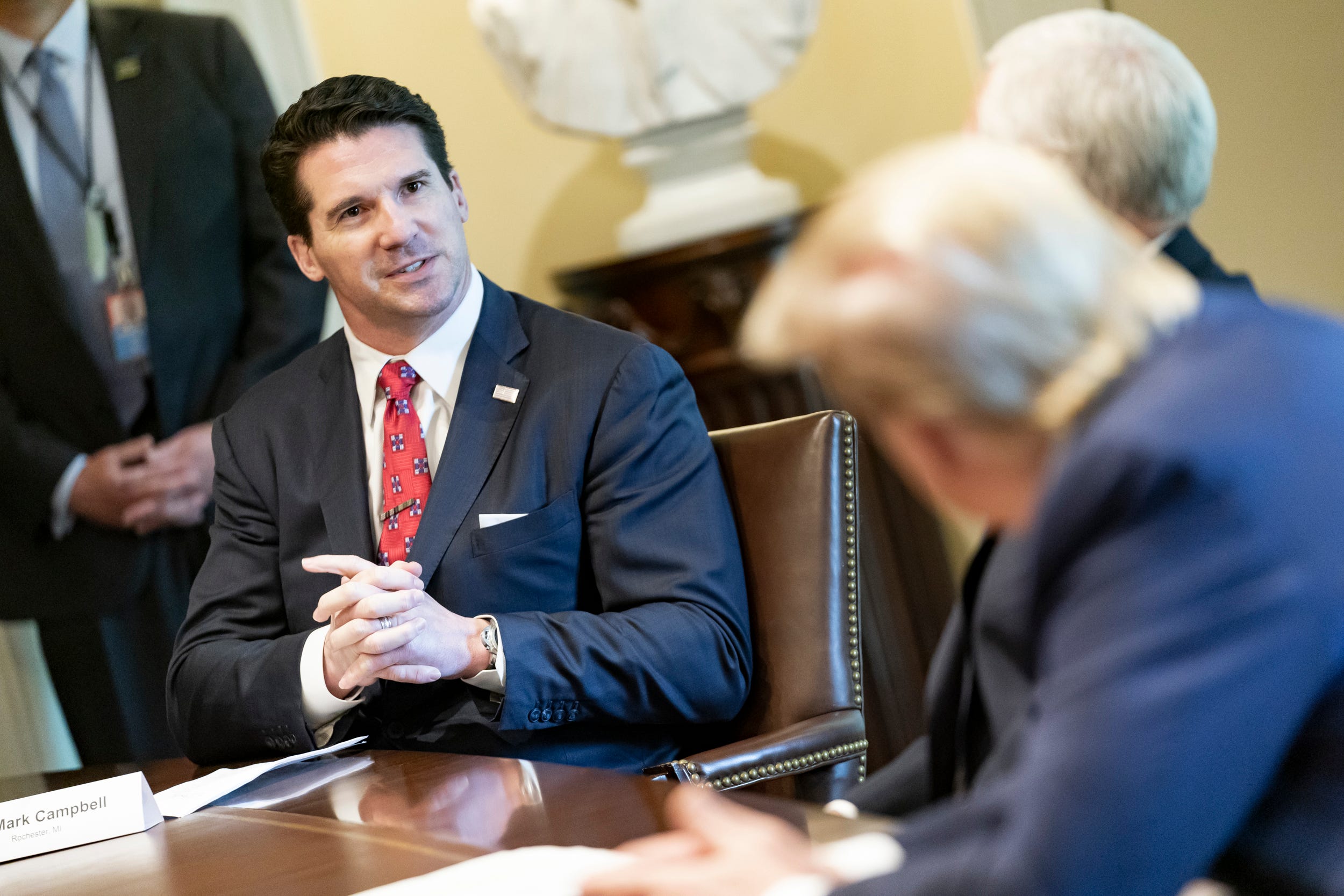Former Michigan, NFL TE Mark Campbell recounts COVID-19 fight: 'Look, it was bad'
 Angelique S. Chengelis
Angelique S. ChengelisMark Campbell, the former Michigan and NFL tight end at 6-foot-5, 265 pounds, was the picture of good health and fitness. The husband and father of three and owner of a local medical supply company and a molecular testing lab, however, debated whether to share his story.

Finally, understanding his brutal experience after contracting COVID-19 might help others like him who are maybe a little bit stubborn because of a toughness mindset —after all, in his case, Campbell spent 10 years in the NFL after playing on the Wolverines’ 1997 national championship team — won out.
“I kinda feel like it was showing weakness or vulnerability,” Campbell, 44, said. “But I just felt like, I have a lot of knucklehead friends and there are a lot of people out there, 30, 40 years old, who don’t think this could ever happen to them, because they’re in shape, they’re healthy. The reason I did it, if a couple people do something because they hear my story, then it’s probably worth it. If people start wearing a mask when they’re going to places with a lot of people, it’s probably worth it.
“What I didn’t know, and I didn’t put a lot of thought into it, was that it would actually catch on and become a bigger story. I certainly didn’t think I’d ever be at the White House.”
Campbell, now 25 pounds lighter after roughly 30 days in quarantine, was one of eight coronavirus survivors to meet with President Donald Trump and Vice President Mike Pence on Tuesday at the White House. Karen Whitsett, a Democratic Michigan state representative from Detroit, also survived COVID-19 and was there to share her experience during this global pandemic. Campbell expressed his concern for her district, Detroit, which has been hard hit by the coronavirus and is, he said, “in desperate need of support” for essential items like food and medication.
“You’re a big, powerful guy, and this little bug knocked the hell out of you, right?” Trump said during the televised meeting as he looked to his right speaking to Campbell.
Campbell gave the group a synopsis of his ordeal to those gathered at the White House meeting and later had an extended conversation with The Detroit News.
“I’m a relatively a tough guy. Look, it was bad,” Campbell told The News. “It was 17 straight days with a fever over 101. It seems like I had everything. When people talk about all the symptoms, I’m like, ‘Yep yep, yep for most of those except runny nose.’”
The first day he had a fever, he and his wife, Michell, went to Troy Beaumont for drive-through testing.
"They took my vitals," he said. "They had me at a normal temperature because they did it wrong. I had a 102 temp at that time, and I was like, ‘Really? It’s normal?’ They had already told me they weren’t going to test me because I was young, I had no family healthy issues and no comorbidities. So, they sent me home and said you probably have it, go quarantine 14 days. Well, that was a disaster.”
Between Days 8 and 12 of his self-quarantine in the basement, Campbell would wake up in the middle of the night out of breath.
“And I was like, ‘It’s going to turn the corner,’” he said. “And it never did.”By Day 12, he could not take deep breaths, and if he tried to, a dry cough kicked in.
He didn’t improve during that quarantine. Campbell decided he had to return to the hospital and this time, he and Michell went to Ascension Providence Rochester Hospital.

“All in all, over the course of those 17 days, I would tell you 24 hours of it, I was scared,” he said. “On the way to the hospital, that was scary. It wasn’t because of me, but whenever my wife, during half the drive there, she’s looking at me, and seeing the concern on her face, that was hard.
“Then when I got to the hospital, they’re asking me all these questions, and I don’t know if they’re going to turn me away. It was only 5, 10 minutes, then they’re like, ‘We’re admitting you.’ When I started leaving, I couldn’t hug my wife, it wasn’t like she was standing next to me. When I turned back, she was walking out, and I called her name. She turned around, and she was bawling. That broke my heart. It hit me right at that instant, and I don’t want to be dramatic with this, but right at that instant it hit me, and I thought to myself, ‘Am I going to see her again?’ And I just told her that I loved her and tell the kids I love them. At the end of the day, that’s the only thing that matters.”
Campbell was placed in a room on Floor 5 and was administered azithromycin and zinc through an IV the first 24 hours. The next day, Troy Evans, who also played in the NFL and is Campbell’s business partner, suggested he ask about hydroxychloroquine. Campbell knew it only as the “malaria drug” and mentioned it to the doctor. He was given the medication.
“I would say within about eight to 12 hours, I started to feel better,” Campbell said. “And by 24 hours, now my mindset changed to, ‘I’ve got to get better.’”
During the conversation at the White House with Trump and Pence, Campbell shared the challenge of being isolated in a hospital room.
“I made that point that for the people (attending the White House meeting), OK, these are the good stories,” Campbell said. “There are eight people here who either survived, recovered or whatever word you want to use, but for the people that it doesn’t go as well, they’re all alone. And it’s a lonely feeling. They’re all alone and some of them are dying alone.”

There was a secondary purpose that factored into Campbell’s decision to attend the meeting at the White House. Campbell was disappointed with the COVID testing procedure, or lack of during his first hospital visit. Even his second test took five days to produce results and was given those the day he was discharged from Ascension. As CEO of Royal Oak-based Medkinect, his lab has two locations and the ability for testing.
“So while all these people are waiting for testing, we could be testing and helping, but we would never get paid for it," Campbell said, because insurance companies are tied in with bigger labs. "It would be an overall loss. So here we want to help, but literally as a small business, it may put us out of business to help. I’m trying to say as a small business, and if America is built on small business, we need help or we need to get in contracts with all these big insurance payers. They’re doing roughly 150,000 tests around the country a day for COVID-19. They can’t keep up with that.”
“It could help a small business like mine, and we could provide more support to the people who need it right now. I know things seem to be trending a little bit better, but there are still a lot of people to be tested and additionally, how are we going to handle this when we go back to work? Is everyone going to have to get tested? How about next fall? Is this going to go away and come back? And the last point I would make, what about the next pandemic? Are we going to be in the same situation?”
Campbell said he is about 95% back to full health, but he’s gradually working back riding his stationary bike and using the elliptical machine. He has plans to join the Warren De La Salle football staff this fall and will coach tight ends and H-backs and possibly receivers, while also coaching his fourth-grade son’s team.
He was able to rejoin his wife and kids Caden, Evan, and Case, last Sunday to celebrate Easter. Campbell still can’t quite believe his surreal existence with COVID-19 the past month and hopes others with symptoms respond to them faster than he did.
“Being an athlete worked against me in the sense of toughness and mental attitude, and I would tell you, you certainly need a mental strength,” he said. “If I had admitted to myself much earlier how bad it was, and gone to the hospital a little sooner with the idea you go there with less severe symptoms, you leave the hospital sooner.”
achengelis@detroitnews.com
Twitter: @chengelis